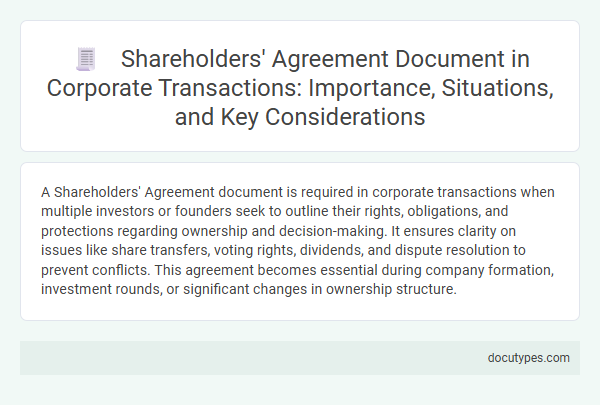A Shareholders' Agreement document is required in corporate transactions when multiple investors or founders seek to outline their rights, obligations, and protections regarding ownership and decision-making. It ensures clarity on issues like share transfers, voting rights, dividends, and dispute resolution to prevent conflicts. This agreement becomes essential during company formation, investment rounds, or significant changes in ownership structure.
Introduction to Shareholders’ Agreements in Corporate Transactions
A shareholders' agreement is a crucial document in corporate transactions that outlines the rights, responsibilities, and protections of shareholders. This agreement ensures clarity and prevents disputes among owners by defining how the company will be managed and how decisions are made.
Your shareholders' agreement is required when multiple parties invest in a company, particularly in startups, joint ventures, or acquisitions. It becomes essential to regulate ownership interests, voting rights, dividend distribution, and exit strategies during these corporate events.
Defining a Shareholders’ Agreement: Core Elements
A Shareholders' Agreement is a legally binding document that outlines the rights, obligations, and responsibilities of shareholders in a corporation. Core elements include share ownership, voting rights, dividend distribution, and mechanisms for resolving disputes. This agreement ensures clarity and protection for all parties during corporate transactions.
Importance of Shareholders’ Agreements for Corporate Governance
Shareholders' agreements are essential in corporate transactions to establish clear rights and obligations among shareholders. These agreements play a critical role in maintaining structured corporate governance and preventing disputes.
- Defines Shareholder Rights and Responsibilities - A shareholders' agreement outlines the specific powers, duties, and protections for each shareholder, ensuring clarity and fairness.
- Regulates Decision-Making Processes - It sets forth voting rules and procedures, promoting transparency and consistency in corporate decisions.
- Prevents and Resolves Conflicts - The agreement provides mechanisms for dispute resolution, minimizing the risk of litigation and business disruption.
Situations Necessitating a Shareholders’ Agreement
A Shareholders' Agreement document is required in corporate transactions when multiple investors or partners hold equity in a company and seek to define their rights and obligations clearly. Situations necessitating this agreement include new business formations, capital injections by new shareholders, and restructuring events that alter ownership percentages. The document ensures protection of minority shareholders, dispute resolution mechanisms, and governance rules tailored to the specific transaction.
Key Provisions in a Shareholders’ Agreement Document
A Shareholders' Agreement document is essential in corporate transactions to define the rights and obligations of shareholders. It ensures clarity and prevents disputes by outlining key governance and operational rules.
- Shareholder Rights and Obligations - Specifies voting rights, dividend distribution, and shareholder responsibilities to maintain corporate balance.
- Transfer of Shares - Defines conditions and restrictions on selling or transferring shares to protect company control and shareholder interests.
- Dispute Resolution Mechanisms - Establishes procedures for resolving conflicts, including mediation or arbitration, to avoid litigation and maintain business continuity.
Rights and Obligations of Shareholders
A Shareholders' Agreement document is required in corporate transactions when defining the rights and obligations of shareholders to ensure clarity and prevent disputes. This agreement outlines how shareholders interact, make decisions, and share responsibilities within the company.
- Right to Vote - Shareholders are granted specific voting rights that influence corporate governance and strategic decisions.
- Obligation to Capital Contribution - Shareholders may be required to contribute capital according to agreed terms to support company operations and growth.
- Right to Information - Shareholders have the right to access important financial and operational information of the company to make informed decisions.
Your understanding of these rights and obligations is crucial when entering or modifying a Shareholders' Agreement in any corporate transaction.
Decision-Making Processes and Dispute Resolution
| When Is a Shareholders' Agreement Document Required? | A Shareholders' Agreement document is essential during corporate transactions that involve changes in ownership structure, strategic decision-making, or potential conflicts among shareholders. It outlines the rights, responsibilities, and protections for all parties involved to ensure stability and clarity. |
|---|---|
| Decision-Making Processes | The agreement defines how key decisions are made, specifying voting rights, quorum requirements, and approval thresholds. Clear guidelines prevent deadlocks and ensure that Your corporation operates smoothly by allocating decision power appropriately among shareholders. |
| Dispute Resolution | Disputes are addressed within the agreement through predefined mechanisms such as negotiation, mediation, or arbitration. These structured procedures help avoid lengthy litigation and promote quick, efficient conflict resolution, preserving business relationships and minimizing operational disruptions. |
Exit Strategies and Share Transfer Restrictions
A Shareholders' Agreement document is required during corporate transactions to clearly define exit strategies and share transfer restrictions. This agreement ensures that all parties understand the conditions under which shares can be sold or transferred, protecting stakeholder interests.
Exit strategies in a Shareholders' Agreement detail the processes for selling shares, including rights of first refusal, tag-along, and drag-along clauses. Share transfer restrictions limit who can acquire shares, often requiring board approval or adherence to pre-agreed criteria. These provisions maintain corporate stability and prevent unwanted ownership changes during transactions.
Enforcement and Legal Considerations
When is a shareholders' agreement document required in corporate transactions? A shareholders' agreement is essential to outline the rights, obligations, and protections of shareholders during changes in company ownership. Enforcement of this agreement ensures that all parties adhere to agreed terms, reducing the risk of disputes and legal challenges.
What legal considerations affect the enforceability of a shareholders' agreement? Courts generally enforce shareholders' agreements that comply with corporate law, accurately reflect shareholder intentions, and do not conflict with a company's articles of incorporation. Proper drafting, clear dispute resolution clauses, and adherence to statutory requirements are critical factors for legal validity.
When Is a Shareholders’ Agreement Document Required in Corporate Transactions? Infographic

